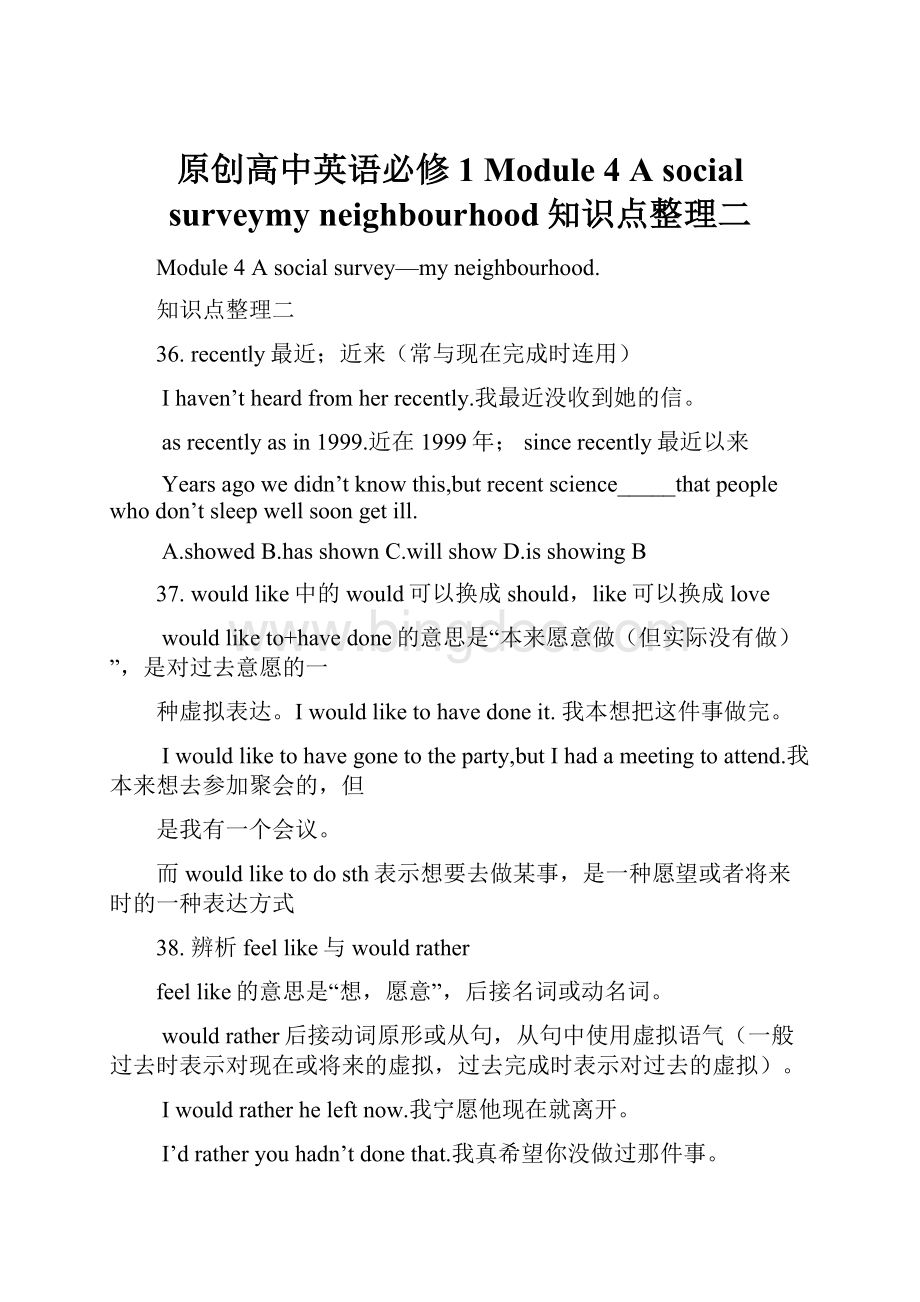原创高中英语必修1 Module 4 A social surveymy neighbourhood知识点整理二.docx
《原创高中英语必修1 Module 4 A social surveymy neighbourhood知识点整理二.docx》由会员分享,可在线阅读,更多相关《原创高中英语必修1 Module 4 A social surveymy neighbourhood知识点整理二.docx(28页珍藏版)》请在冰点文库上搜索。

原创高中英语必修1Module4Asocialsurveymyneighbourhood知识点整理二
Module4Asocialsurvey—myneighbourhood.
知识点整理二
36.recently最近;近来(常与现在完成时连用)
Ihaven’theardfromherrecently.我最近没收到她的信。
asrecentlyasin1999.近在1999年;sincerecently最近以来
Yearsagowedidn’tknowthis,butrecentscience_____thatpeoplewhodon’tsleepwellsoongetill.
A.showedB.hasshownC.willshowD.isshowingB
37.wouldlike中的would可以换成should,like可以换成love
wouldliketo+havedone的意思是“本来愿意做(但实际没有做)”,是对过去意愿的一
种虚拟表达。
Iwouldliketohavedoneit.我本想把这件事做完。
Iwouldliketohavegonetotheparty,butIhadameetingtoattend.我本来想去参加聚会的,但
是我有一个会议。
而wouldliketodosth表示想要去做某事,是一种愿望或者将来时的一种表达方式
38.辨析feellike与wouldrather
feellike的意思是“想,愿意”,后接名词或动名词。
wouldrather后接动词原形或从句,从句中使用虚拟语气(一般过去时表示对现在或将来的虚拟,过去完成时表示对过去的虚拟)。
Iwouldratherheleftnow.我宁愿他现在就离开。
I’dratheryouhadn’tdonethat.我真希望你没做过那件事。
39.payback归还(借款)等;报答;报复
Hepaidbackhisdebts.(debtdet)他偿还了债务。
Youcanpaybacktheloanləʊn贷款overaperiodofthreeyears.你可以在三年内分期归还贷
款。
Canyoulendmesomemoney?
I’llpayyoubacktomorrow.你能不能借我点钱?
我明天还给你。
OnedayI'llpaybackthatboywhobrokemybike!
总有一天我得对弄坏我自行车的那个男孩报复一下!
paydown即时支付,付现金
payfor为(买的东西)付钱
pay为不及物动词,其宾语多为物,即pay for sth意为“付款买某物”;其宾语为人时,即pay for sb意为“替某人付款。
”如:
Shall I pay for you?
我替你付款好吗?
He can't pay for the TV set at the moment.他现在还不能给这台电视机付款。
payoff付清,还清(债务)
After all these years,we've at last paid off all our debts. 经过这么多年,我们总算把债还清了。
paysbforsth因……而付给某人钱
payout(为某事)付出大笔款项。
Ipaidoutalotofmoneyforthatcar.为了那辆汽车我花了不少钱。
Hehadpaidoutgoodmoneytoeducatehisdaughterataboardingschool.
他花了很多钱让他的女儿在寄宿学校受教育。
payattentionto注意,留心
ThenecklaceI____80dollarsismadeofglass.AndIhavenotpaid____themoneyIborrowed
fromTom.
A.paidfor;offB.spenton;backC.cost;offD.boughtfor;backD
40.现在完成时
(1)现在完成时否定疑问句的构成是:
Haven’t/Hasn’t+主语+过去分词?
或Have/Has+主语+not+过去分词?
(2)现在完成时的基本用法:
IhaveseenthefilmTitanic.我看过电影《泰坦尼克号》。
(相当于:
IsawthefilmTitanicandIknowitscontent.)
Haveyouhadyourlunchyet?
你吃午饭了吗?
(相当于Didyouhaveyourlunch?
Areyouhungrynow?
)
在时间状语从句和条件状语从句中经常用一般现在时表一般将来时,用现在完成时表示将来完成时。
IwilllendyouthebookassoonasIhavefinishedreadingit.我一看完这本书就借给你。
现在完成时的时间状语还有:
sofar,bynow,uptonow/tillnow/uptillnow,recently,inthepast/lastfewyears.
(3)现在完成时与一般过去时的区别:
现在完成时强调对现在的影响和结果;一般过去时强调这个动作发生的时间是在过去。
I’velivedherefortenyears.(现在仍在这儿)
Ilivedherefortenyears.(现在不住这儿)
Hehasboughtahouse.(现在已拥有这栋房子)
Heboughtahousetenyearsago.(现在是否拥有这栋房子不清楚)
(1)Mymotherisaretiredteacher;she_____inahighschoolinXiamenfor30years.
A.hastaughtB.hadtaughtC.taughtD.hadbeentaught.
(2)—Whenshallwerestartri:
'stɑ:
tourbusiness?
—Notuntilwe____ourplan.
A.willfinishB.arefinishingC.aretofinishD.havefinished
(3)ThepopulationofJiangsu____tomorethantwicewhatitwasin1949.Thefigureisnowapproaching74million.
A.hasgrownB.havegrownC.grewD.aregrowing.
(4)Whenyouarehome,giveacalltoletmeknowyou___safely.
A.arearrivingB.havearrivedC.hadarrivedD.willarrive
(5)—Ispaulplayingbothsoccerandtennisfortheschool?
—He____.Butnowhehasgivenupplayingtennis.(为学校)
A.isB.hasC.wasD.had
(6)Nowthatsheisoutofwork,Lucy____goingbacktoschool,butshehasn’tdecidedyet.
A.hadconsideredB.hasbeenconsideringC.consideredD.isgoingtoconsider
(7)—Haveyouheardabouttherecentelectionɪ'lekʃn?
—Sure,it________theonlythingonthenewsforthelastthreedays.
A.wouldbeB.isC.hasbeenD.willbe
—你听说最近的选举没有?
—当然,这是最近三天新闻唯一干的事情。
(8)—Alicecamebackhomethedaybeforeyesterday.
—Really?
Where____atall?
A.hadshebeenB.hadshegoneC.hasshegoneD.hasshebeen
(9)—Whydidn’tyougotoseethefilmHarryPotter?
—BecauseI___ittwice.
A.haveseenB.hadseenC.sawD.amseeing
(10)I___allthecookingformyfamily,butrecentlyI’vebeentoobusytodoit.
A.willdoB.doC.amdoingD.haddone
(11)—YouspeakverygoodFrench!
—Thanks.I____FrenchinSichuanUniversityforfouryears.
A.studiedB.studyC.wasstudyingD.hadstudied
(12)I____inLondonformanyyears,butI’veneverregrettedmyfinaldecisiontomovebacktoChina.
A.livedB.waslivingC.havelivedD.hadlived
(1)C
(2)D(3)A(4)B(5)C(6)B(7)C(8)A(9)B(10)B强调经常习惯的动作用一般现在时。
(11)A(12)A他住在伦敦应属于过去的事情。
41.exchangevt“交换”,常见搭配有:
exchangeAforB以A换B
exchangesthwithsb同某人交换某物
Youcanexchangeyourcoatfortendollarsinthisshop.
在这家店你可以用你的外套换十美元。
Ifyouhaveachancetoexchangeviewswithyourboss,you’dbettertellhimthetruth.如果你有机会和你的老板交换看法,你最好告诉他事情的真相。
exchange还可以作名词,意为“交换;兑换”。
inexchangefor…作为对……的交换Shouldchildrengetpocketmoneyinexchangeforchores?
小孩子应该用做家务来交换零花钱吗?
inexchange作为交换I’lltypeyourreportifyou’llbabysitinexchange.如果你愿意代我照看孩子,我就把这个报告给你打出来。
Itisillegalɪ'li:
ɡl违法的forapublicofficialə’fɪʃl(公务员)toaskpeopleforgiftsormoney____favours‘feɪvə(r)恩惠,帮助tothem.
A.inpreferencetoB.inexchangeforC.inplaceofD.inagreementwithB
42.与get相关的短语
getacross使被理解;把……说清楚
getthrough接通;完成;通过,解决
getalongwith相处;进展
getoutof摆脱;逃避
getdownto着手
getaway走开,离开;脱身;休假getawayfrom从……(地方)走开,离开;摆脱掉
getawaywith逃避责罚,免受处罚,受较轻处罚。
如:
Ifyoucheatintheexam,you’ll
nevergetawaywithit.考试作弊必予追究。
getover克服,解决
getdown下来,记下,使沮丧
geton进展,进步,穿上,上车
getoff脱下,下车
getin收集,插(话)
getround消息传开,(能)到处走动,旅行。
getclosetosth.接近,几乎
getinto(trouble)(给…)找麻烦,(使)陷入困境
getto(know)渐渐开始(知道)
getback取回,收回
getout出来;出版;(使)出现;作出
HefounditdifficulttogethisAmericanjokesacrosstohisEnglishaudiences.‘ɔ:
diəns他发觉他的美国笑话很难使英国听众发笑。
Irangyouseveraltimesbutcouldn’tgetthrough.
Wegetalongverywellwitheachother.
Icouldn’tgetoutofgoingtothatwedding.
Hegotdowntohisworkaftertheholidays.
I’mtoobusytogetawayfromworkatthemoment.我此刻工作太忙抽不开身。
Theboyclimbedupthetreeandcouldn’tgetdown.小男孩爬上树,却下不来了。
HespoketoofastandIcouldn’tgetdownallhesaid.他说得太快,我无法记下他所说的所有东西。
Idon’tmindyouknowing,butIdon’treallywantittogetabout.我不是不让你知道,但我实在不想让它传出去。
Hedidn’tgetaboutmuchaftertheoperation.手术后他不常外出去动。
(1)Ihadhopedtotakeaholidaythisyear,butIwasn’tableto_____.
A.getawayB.dropinC.checkoutD.holdon
(2)Afterthat,heknewhecould_____anyemergencyɪ'mɜ:
dʒənsɪ紧急情况,突发事件bydoingwhathecouldtothebestofhisability(竭尽全力).
A.getawaywithB.getonwithC.getthroughD.getacross
(3)Teamleadersmustensureɪn'ʃʊə(r)thatallmembers____theirnaturaldesiredɪ'zaɪətoavoid
theembarrassmentɪm’bærəsməntassociatedə'səʊʃɪeɪtwith把…和…联在一起making
mistakes.
A.getoverB.lookoverC.takeoverD.comeover.
(4)We’vejustmovedintoabiggerhouseandthere’salotofthingstodo.Let’s___it.
A.keepupwithB.doawaywithC.getdowntoD.lookforwardto
(1)我原本希望今年去度假的,但是我没能休假。
(2)从那以后,他知道只要尽全力就能解决一切紧急事件。
(3)团队领导必须确保所有的成员克服他们的本能欲望以避免因犯错而引发的尴尬。
(1)A
(2)C(3)A(4)C
43.reasonn原因,理由
(1)reasonfor+n/pron/v-ing.“……的原因”
Whatwasthereasonforhisresignationrezɪg’neɪʃn辞职?
(2)reason后面接定语从句时,若从句中缺少原因状语,用why引导;缺少主语或宾语,用that或which引导。
Thereasonwhyhewaslatewasthathegotuplatethismorning.
Hegavemethereasonthatwasunbelievableʌnbɪ’li:
vəbl.他给了我一个令人难以置信的解释
(3)reason作主语时,后面的表语从句只能用that引导,不能用why或because。
Thereasonwhyhewaslatewasthathegotuplatethismorning.
(4)reason后面接同位语从句时,同位语从句大多由that引导,具体说明reason的内容。
Hegavemethereasonthathegotuptoolatethismorning.
cause指事情发生的直接原因。
后面常接of。
Doyouknowthecauseofthewar?
excuse指为某一行为所做的解释,可以说是真的,也可以是托词。
Sheisalwaysmakingexcusesforbeinglate.她迟到总是有借口。
(1)Onereasonforherpreference‘prefrəns偏爱forcitylifeis_____shecanhaveeasyaccess'ækses名词,入口,进入toplaceslikeshopsandrestaurants.
A.thatB.howC.whatD.why
(2)Nobodybelievedhisreasonforbeingabsentfromtheclass____hehadtomeethisuncleattheairport.
A.whyB.thatC.whereD.because
(3)PartofthereasonCharlesDickenslovedhisownnovel,DavidCopperfield,was____itwasratherclosely'kləʊslɪ接近地modeledonhisownlife.model'mɒdl
A.whatB.thatC.whyD.whether
(1)A她喜欢城市生活的原因之一就是她可以轻松地出入像商店和餐馆这样的地方
(2)B(3)查尔斯·狄更斯喜欢他自己的小说《大卫·科波菲尔》的部分原因是这本小说更多的是以他自己的生活为模本的。
B
44.remainv仍然是;保持;剩下,留下
(1)remain作为系动词时,意为“仍然是;保持”,强调保持原来的状态,后接形容词、名词、分词、介词短语等作表语,不能接副词。
He’sdeterminedtoremainloyal'lɔɪəl忠心的totheteamwhatevercomesonhisway.他决心不管发生什么事都忠于球队。
(2)remain作为实义动词时,意为“剩下,留下”.
Iwenttothecity,butmybrotherremainedathome.
remainingrɪ’meɪnɪŋadj“剩下的”作前置定语。
theremainingfood剩饭。
Consideringherdaughter’sbirthdaywascoming,MrsSmithwantedtobuyherapresentwiththeremaining20dollars.考虑到女儿的生日即将来临,史密斯先生想用剩余的20美元给她买个礼物。
remaintobedone有待于做……
Nothingremainstobesaid.现在已经没有什么好说的了。
(1)Whilethepolicehavealreadydonealotofinvestigationɪn’vestɪ'ɡeɪʃn,调查muchevidence
'evɪdəns证据_____.
A.isremainingtobeconfirmedB.remainedtobeconfirmed
C.isremainedtobeconfirmedD.remainstobeconfirmed
(2)Ladiesandgentlemen,pleaseremain____untiltheplanehascometoacompletestop.
A.seatedB.seatingC.toseatD.seat
(1)虽然警察已经做了大量的调查,但很多证据还有待证实。
D
(2)A
45.affordvt买得起;有能力支付,后接名词、代词和动词不定式作宾语,不能用于被动语态,常与can,could或beableto连用。
Hisparentscouldn’taffordhisschooling,sohedroppedoutof不参与,退出school.
他的父母付不起他的学费,所以他辍学了。
canaffordtodosth买得起,负担得起,花得起时间
Thehotelwantedtochargetʃɑ:
dʒ索价$150fortheroomservice,butwecouldn’taffordtoliveinsuchanexpensivehotel.
这家宾馆要收150美元的客房服务费,但是我们住不起这么昂贵的宾馆。
affordsbsth=affordsthtosb给予某人某物
(1)I’dlovetogoonvoyage'vɔɪɪdʒ旅行toTahitiwithRobin,butIdoubtifwecould____it.
A.affordB.offerC.permitD.receiveA
(2)Theboysaidthathecouldnot____anewrecorderrɪ’kɔ:
də(r)onhissmallsalary.
A.spareB.affordC.shareD.save
那个男孩说因为他的薪水低,他买不起一台新录音机。
(